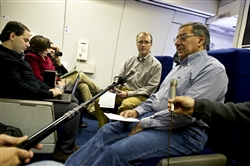Secretary of Defense Leon Panetta, while on a trip to Colombia, claimed that Iranian attempts to expand its influence in South America amounted to “expanding terrorism.”
 “We always have a concern about in particular the [Iranian Revolutionary Guard Corps] and [their] efforts . . . to expand their influence not only throughout the Middle East but into [South America] as well,” Panetta told reporters Monday.
“We always have a concern about in particular the [Iranian Revolutionary Guard Corps] and [their] efforts . . . to expand their influence not only throughout the Middle East but into [South America] as well,” Panetta told reporters Monday.
“That, in my book, that relates to expanding terrorism. And that’s one of the areas that I think all of us are concerned about,” he added.
Washington has had a paranoia about Iranian infiltration of South America for a long time, despite scant evidence of any such threat. After GOP candidates expressed similar fear-mongering last November, Politfact gave it a rating of “mostly false.”
The State Department, too, concluded in their Country Reports on Terrorism (issued August 2010) that “the threat of a transnational terrorist attack remained low for most countries in the Western Hemisphere” and that “there were no known operational cells of either al-Qa’ida- or Hizbollah-related groups in the hemisphere.”
Aside from the lack of evidence for any rising Iranian military or proxy threat south of the border, the fact that Panetta would voice concern here is revealing. For over a hundred years, the United States has wrought terror, war, poverty, and repression throughout Latin America in the form of CIA-orchestrated military coups, support of terrorists and undemocratic regimes, and a very bloody war on drugs, all while peppering the entire region with the U.S. military.
And while criticizing Iran for an essentially non-existent interference in South America, the U.S. continues to intervene militarily all over the Middle East, with a similar history of military coups, war crimes, and propping up dictatorships. To criticize Iran for such meddling is patently hypocritical.


